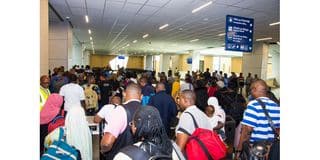Dar es Salaam. The launch of electric train services on the standard gauge railway (SGR) tracks by President Samia Suluhu Hassan on August 1, 2024, is a landmark achievement for Tanzania and the East African region.
This development is particularly noteworthy given Tanzania’s historical reliance on the antiquated meter gauge railway (MGR) for more than a century.
The eletric train services launched by President Hassan on Thursday run between Dar es Salaam, Tanzania’s commercial capital and Dodoma, Tanzania’s official designated capital.
The services have cut travel time between the two cities significantly from nine hours to three, potentially threatening to give airlines a run for their money.
The Tanzania Railways Corporation (TRC) deserves recognition for managing this substantial project, one of the largest in Tanzania’s history.
However, TRC now faces the critical challenge of addressing teething problems.
Most of these challenges have come in the name of electrical faults that cause unexpected train halts in remote areas sometimes for hours at night.
These issues, which were not evident during test runs, are now under intense public scrutiny.
Teething problems are common to a project of SGR’s scale.
However, a major concern has been the perceived lack of an effective communication strategy to manage passenger and public relations during these disruptions.
Delayed communication or attempts to conceal technical issues have fuelled misinformation, rumours and exaggerated tales of what exactly happened.
If this persists, it could erode the sense of safety and credibility that are the cornerstones of SGR’s success.
In the era of the internet and social media, a defective communication strategy is a self-inflicted wound for any organisation.
As the TRC fixes technical faults, it is also crucial to focus on improving its public communication strategy.
Here are strategies the TRC could implement to enhance its public relations and communication efforts:
Transparent and proactive communication
To manage public relations effectively, TRC must prioritise transparency and proactive communication.
This involves regularly updating the public on the progress of addressing technical issues.
Clear and frequent updates about the problems faced and the steps being taken to resolve them will help maintain public trust.
Utilising a range of communication channels, including press conferences, social media, and traditional media, will ensure that the message reaches a broad audience.
Effective engagement with the media
Engaging with the media is crucial for effective communication.
TRC’s media relations team should handle enquiries promptly and provide regular briefings on the SGR project.
Offering media access to key experts and officials and organising tours of the SGR facilities will enhance media relations and ensure comprehensive coverage of the project.
Some print media journalists feel sidelined, yet newspapers are the major sources of news for the electronic media, with print news articles frequently shaping debates in FM morning radio shows.
TRC brings all journalists onboard regardless of the mode of communication channel they use. TRC officials should offer exclusive interviews, organise regular press conferences specifically for print journalists, and collaborate on in-depth feature articles about the SGR project.
Encouraging TRC officials to write opinion pieces for newspapers and providing media training to TRC staff will further improve relations with print media.
Build trust and confidence
Restoring public confidence is essential. The TRC should demonstrate a commitment to passenger safety and satisfaction by acknowledging inconveniences caused by breakdowns and assuring passengers of ongoing improvements.
Highlighting the long-term benefits of the SGR project for the country will help reinforce public support.
Leverage social media: Social media platforms are powerful tools for direct engagement with passengers.
The TRC should use social media to address concerns, provide updates, and respond promptly to feedback.
Monitoring social media for passenger complaints and questions will enable the TRC to manage public perception effectively.

Implement a crisis communication plan
A well-defined crisis communication plan is essential for managing public relations during technical issues.
The TRC should establish a rapid response team comprising representatives from public relations, operations, engineering, and customer service.
Developing clear communication protocols for internal and external communication, identifying key messages, and providing media training to spokespeople will enhance the effectiveness of the crisis response.
Continuous monitoring of media coverage and social media, along with post-crisis evaluation, will help identify areas for improvement.
Effective crisis communication strategies: Timeliness is crucial during a crisis. The TRC should respond promptly and provide regular updates to the public.
Transparency about the situation, coupled with empathy for those affected, will build trust.
Controlling the narrative by proactively providing accurate information and maintaining strong relationships with media outlets will ensure fair and accurate reporting.
This comprehensive approach will not only restore public confidence but also highlight the transformative impact of the SGR on Tanzania’s transportation infrastructure and economic development.
















